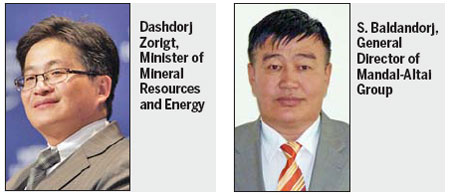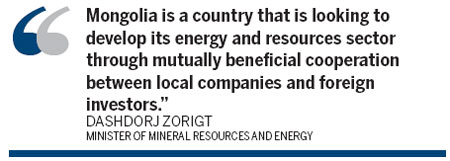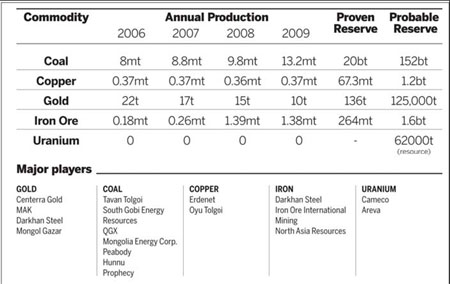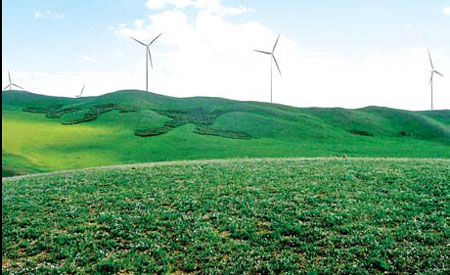News
New mining projects will see economy soar
(China Daily)
Updated: 2010-09-13 09:35
 |
Large Medium Small |
|
Salkhit wind farm developed by Newcom. |

Contract revenues transform Mongolia's landscape
Dependent on mining for a third of its GDP, the Mongolian economy is set to expand even more, with the country's National Development and Innovation Committee predicting growth of around 20.8 percent within three years, thanks to new mines that are coming on-stream.
With plentiful and largely untapped natural resources, mining holds the key to Mongolia's economic sustainable development in the coming years.
The potential transformation of the country on the back of a flourishing mining industry will be huge; energy plants, railroads and rural airports will need to be upgraded to support production, and there will be a strong impact on related sectors, such as transport, energy, construction, and finance.
Subsequent movement of the largely rural population to new growth areas will also impact on the building and staffing of schools, houses, and hospitals.
Responsible for 80 percent of the country's export returns and a significant provider of jobs, the mining sector needs careful management if it is to fulfil its potential and provide the revenues needed to develop the country.
Dashdorj Zorigt, Minister of Minerals and Energy said: "For the future, we are going to work hard to ensure that deposits that have been discovered in Mongolia come to production and that these deposits benefit the country's economy and the living standards of the population. Secondly, we will create significant national companies that will in turn develop energy and resources.
"We are also looking to make sure these projects benefit things like transit transportation, and the external factors the influence the country's economic course."
Erdenet, the largest state-owned mining company is responsible for 30 percent of the country's GDP and is a Mongolian success story. A Russian-Mongolia joint venture since the 1970s, Erdenet is now looking to be listed on the Hong Kong Stock Exchange.
Setting new precedents
This year, the government finalized a deal with Rio Tinto and Ivanhoe Mines to mine Oyu Tolgoi (OT) in the south Gobi desert, which has the largest undeveloped copper deposits in the world.
"This is a major investment project that will affect the country's economy in a very significant way from 2013, when the mine is due to come into production," Zorigt said. "We expect the investment plan of the project to be around $700 million and create significant jobs and businesses for Mongolian companies here."

The Oyu Tolgoi company, which is 34 percent state-owned, represents an unprecedented boon for the economy, with GDP slated to rise by a third, year on year. As Minister of Finance Bayartsogt Sangajav said: "I was the chief negotiator in the last stage of the Oyu Tolgoi agreement and finalized the agreement representing government's side. This was a difficult task because of the various interests that were represented from both the government but also between the parties involved in the negotiation. It was a difficult task, but I couldn't be more happy or proud about the achieved result."
The agreement will bring much-needed jobs, infrastructure, education and training initiatives and of course, wealth to the country.
It will also boost relations with China, as the Governor of the central Bank of Mongolia Lkhanaasuren Purevdorj observed: "The OT project will expand the Mongolian Chinese Partnership and increase trade between the two nations."
Another lucrative project, Tavan Tolgoi, boasts the largest undeveloped coal reserves in the region, with an estimated 7 billion tons of coal. Tavan Tolgoi will remain 100 percent state owned, operating as Erdenes MGL and there has been substantial interest from contractors around the world.
"We are working to reserve an opportunity to create capital for our citizens, develop capital market, connecting them with the major creation and projects and establishing national companies," said Minister Zorigt. "Only if "Erdenes MGL" remains national and leads in the region and world, we will develop.
"Let's take an example from Hyundai, Mitsui. They are all state-owned companies, but they can distribute their wealth to the people through shares. Now they are recognized around the world.
Erdenet represents Mongolia at the world capital market. Likewise, "Erdenes MGL," on an even bigger scale, can represent Mongolia to the world."
Established in 1990, Mandal-Altai Group LLC has interests in construction-it recently rebuilt Chinggis Khaan airport-services, and agriculture, as well as mining. Mandal Khuder LLC, its mining subsidiary, owns special licences for a coalmine in the Gobi-Altai region, some 156 km from the Chinese border. The company has extracted more than 6,000 tons of coal since 2005, and is expected to extract 12,000 tons this year alone.
A coal preparation plant is being built in Hami, in the Zhangjiagang area of China, where they hope to become a major supplier. It will be financed 100 percent by the company.
General director of Mandal-Altai Group LLC, S. Baldandorj, said: "Once the refinery is built, we envisage producing a million tons of coking coal per year."
The Mongolian government is now looking at developing capital markets to better facilitate FDI. "Commercial banks are serving as major sources of lending to our projects, but both domestically and externally we have to look to developing our capital markets, making sure the domestic markets are in place and available for people wishing to invest their money this way," said the mining minister.
"We have announced the international bid for our stock exchange and are planning to privatize this in the near future. We also want to make sure Mongolian companies can access the external capital markets and are able to draw resources from there."

(China Daily 09/13/2010 page20)
